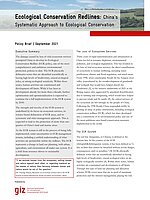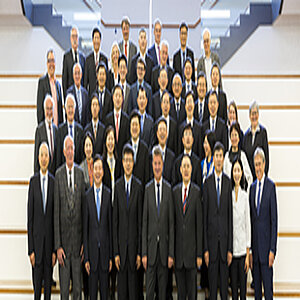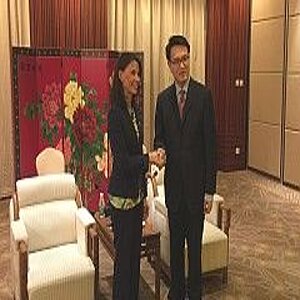2020 IKI Interface Workshop China

Virtual discussion about cooperative elements in climate change mitigation and biodiversity
On October 22 and 23, the Sino-German Climate Partnership hosted the 2020 International Climate Initiative (IKI) Interface Workshop China on behalf of the German Federal Ministry for Environment, Nature Conservation and Nuclear Safety (BMU). Conducted entirely virtually due to travel restrictions surrounding the COVID-19 pandemic, approximately 60 experts and officials from diverse implementing agencies, came together to exchange their ideas, experiences, goals, successes, and challenges concerning IKI and its role in Sino-German cooperation.
In China, there are currently more than 30 IKI-funded projects through which IKI has been able to support China in its commitments to addressing climate change mitigation and the conservation of biodiversity, despite the current global pandemic challenges. Chinese counterparts on the national, regional, and local level responded positively to IKI initiatives, sharing that they have been able to implement effective projects that have augmented China’s climate goals.
Cooperative elements in two interconnected areas: climate change mitigation and biodiversity
During the two days, participants discussed cooperative elements in two interconnected areas: climate change and biodiversity.
There was broad agreement that IKI partnerships have strengthened China’s efforts to combat climate change and have helped enable the country to hasten its path towards curbing carbon emissions. Knowledge-exchange, technology-transfers, and project funding have all been important in catalysing the realisation of China’s climate ambitions. Likewise, China’s own experience has been valuable to Germany, and both countries have learnt a lot by sharing experiences and best practices. Comparing different implementation models and different approaches has proven useful in identifying gaps in knowledge and expertise. Ongoing, as well as future cooperation will no-doubt resolve some of these shortcomings. The cooperation for the implementation of climate policy measures for strengthening the enactment and achievement of the goals of the Paris Agreement will be intensified in the coming years.
IKI work on climate change supports various projects in China, among others the Sino-German cooperation on low carbon transport, the Sino-German Environmental Partnership and other projects to be launched shortly
In terms of policy frameworks and legislation, biodiversity has sometimes taken a backseat to climate change initiatives. However, the global COVID-19 pandemic has brought conservation and biodiversity matters back to the forefront, demonstrating that the loss of biodiversity is a direct threat to public health.
The IKI-funded Sino-German Environmental Partnership (SGEP) has helped make biodiversity an important component to overall bilateral relations. In cooperation with the BMU, the Ministry of Ecology and Environment (MEE) and the China Council on International Cooperation on Environment and Development (CCICED), SGEP explores how to best exchange experiences on the prevention and control of air, water, and soil pollutions, as well as concrete policy recommendations and solutions on biodiversity protection and sustainable production and consumption patterns. This is done with the aim to contribute to more effective environmental and nature conservation in China, as one of the most biologically diverse regions in the world.
In preparation for the Convention on Biodiversity COP 15 next year, widely billed as a crucial moment in biodiversity, much like the Paris Climate COP 21 was for climate change, SGEP is working to provide policy advice on the development and implementation of the post-2020 global biodiversity framework. This bilateral cooperation between China and Germany on this issue is significant in that it represents a unique biodiversity partnership between two large economies and non-contiguous countries from entirely different parts of the world.
Challenges arise when addressing deforestation and landscape degradation. Commodity production is the largest driver of these two phenomena, and more work needs to be done on strengthening sustainable supply chains. So far, China has engaged in spatial analysis and mapping, which helps inform issues surrounding land-use and how to resolve them. This presents an opportunity for Germany (and possible the EU) to learn from China’s mapping experience and use it to help inform EU-wide biodiversity goals.
Deep connections and commitments
The 2020 IKI Interface Workshop highlighted the deep connections and commitments between Germany and China on climate-related matters. IKI has been engaged in China for about 12 years and yet the progress has exceeded expectations with numerous success stories. As the workshop made clear, challenges remain, however given the strength of the relationship between Germany and China on the climate issue, as well as the broader growing partnership between the European Union and China, current and future challenges will be resolved.
The link has been copied to the clipboard
Contact
IKI Office
Zukunft – Umwelt – Gesellschaft (ZUG) gGmbH
Stresemannstraße 69-71
10963 Berlin










![[Translate to English:]](/fileadmin/_processed_/d/d/csm_20221010_Grafik_Klimabildung_Jiangsu_ac3090e434.jpg)


![[Translate to English:] Die Petronas-Türme im Stadtbild Kuala Lumpurs; Foto: Unsplash/Ishan](/legacy/_processed_/f/8/csm_180215_ishan-seefromthesky_Header310_661e6fc5b9.jpg)



